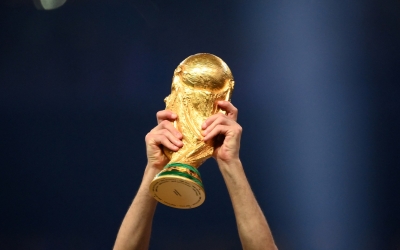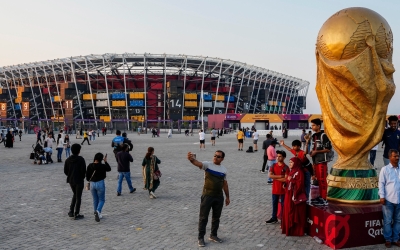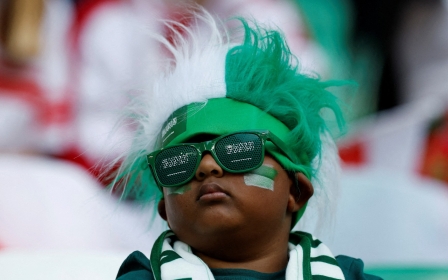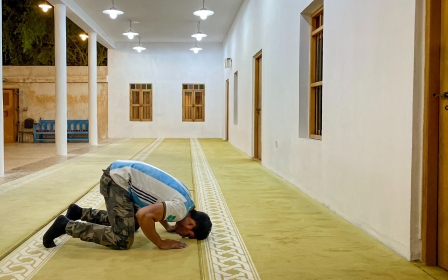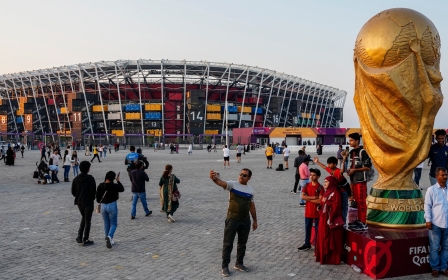Qatar: Fans pin their hopes on Aspire Academy despite World Cup losses
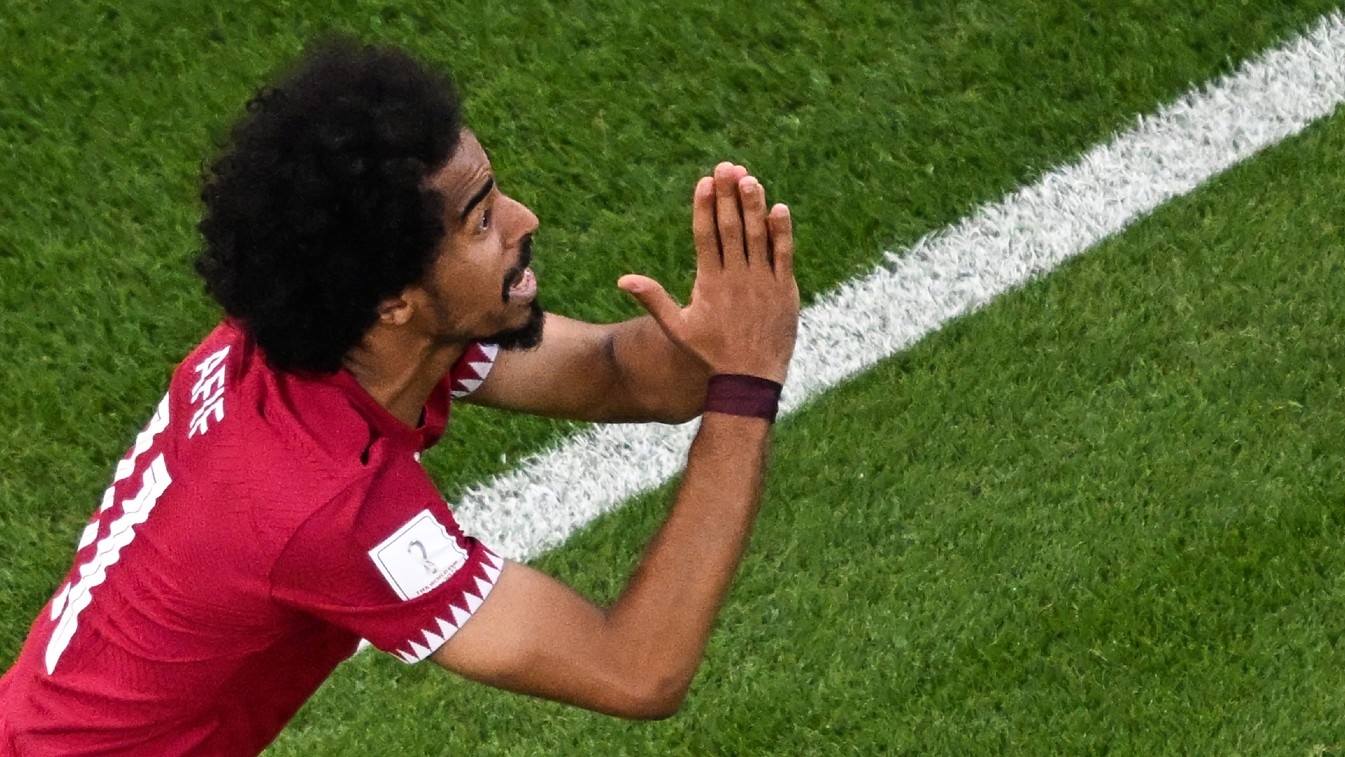
You would think Qatari football fans would feel dejected after the Maroons became the first World Cup hosts to lose all three of their group stage matches.
But the mood in Doha is far from sombre.
Walking around Souq Waqif, which served as the beating heart of this year's tournament, many local fans said they were pleased the hosts didn't fall victim to a 10-0 drubbing.
When Qatar took the pitch in their opening game against Ecuador they were expected to be pummelled. Instead they lost 2-0, but showed flashes of brilliance.
They then suffered a 3-1 loss to Senegal and a 2-0 loss against 2010 runners-up Netherlands in their final group game.
New MEE newsletter: Jerusalem Dispatch
Sign up to get the latest insights and analysis on Israel-Palestine, alongside Turkey Unpacked and other MEE newsletters
'Will the academy still have a significant legacy once the World Cup has passed, or will funding and appetite from senior management disperse?'
- Martin Lowe, The Asian Game
Despite the defeats, fans have rallied around the national team and head coach Felix Sanchez in particular, with many pinning their hopes on a local football academy to hone future talent, superstars and even Ballon d'Or candidates.
Before this year's tournament, much was said of Qatar's footballing heritage and whether a country that had failed to qualify for a tournament was suitable to host one.
But looking at Qatar's footballing trajectory, it's easy to understand why they hadn't.
When Uruguay hosted the first World Cup in 1930, Qatar had no time for football. Its pearl trade had collapsed and the Great Depression impacted global economies.
Closer to home, Bahrain imposed a crushing embargo on Qatar over the loss of Zubara city in a British mediation.
The story goes that Qatari interest in the sport began in 1948 when newly arrived oil industry workers played the game for leisure. The Najah football club was formed in 1950 and a year later the Qatar Oil Company organised the Ezz Eddin Tournament at Dukhan.
It would take another two decades for Qatar to become a footballing nation with the Maroons playing their first international match in 1970 - a game they lost 2-1 against their regional rivals Bahrain.
Hired and fired
When the Qataris saw their regional counterparts shine in the late 70s and 80s, they did the obvious - hired Brazilian coaches for domestic clubs and the national team. There was even a brief period where European coaches plied their trade in the country.
"The Qataris soon realised they were physically inferior to the Europeans' hit-and-run power game, and went back to South American coaches and their possession-based game, featuring short passes and triangular build-ups," Doha-based sports journalist D Ravi Kumar, who has edited several Qatari sports publication over the last three decades, told Middle East Eye.
Brazilian Evaristo de Macedo was one of them.
Under the management of the former Barcelona star, Qatar stunned the world in 1981. They made it to the final of the Youth World Championship in Australia.
But when things didn't move the way the Qatar Football Association (QFA) imagined, coaches were fired.
Another Brazilian, Carlos Alberto Parreira, who coached the United Arab Emirates, Saudi Arabia and Kuwait, once said of Arab teams in general: "They want results very quickly, but there is no continuity. One day there is a Brazilian coach, [then] a French... a Spanish... Croatian… [and] Dutch. They've got to concentrate on one school of football."
Qatar was no different: it hired and fired 41 coaches between 1969 and 2017.
The 90s and 2000s were largely uneventful, despite the Maroons lifting the Gulf Cup in 1992 and 2004.
So, in an attempt to inject some creativity into the team, Qatar set about naturalising foreign-born players who had impressed in the Qatari league system, despite repeated objections from Fifa and sports fans.
But in the background, a dream - envisioned by former Qatari Emir Hamad bin Khalifa Al Thani was beginning to take shape.
'Dream is on the right path'
In 2004, Al Thani established the Aspire Academy, an elite sports training school at the cost of $1.4bn. Touted as Qatar's equivalent to Clairefontaine, it was visited by footballing greats Pele and Diego Maradona.
Each year, more than 700,000 young footballers in 14 countries across Asia, Africa and Latin America are screened. Those deemed to show promise are awarded scholarships.
While the national side was busy with naturalising foreign-born players such as Brazil's Rodrigo Tabata and Uruguay's Sebastian Soria, Felix was at Aspire trying to nurture local talent.
"When the Aspire Academy was started, it was with the objective to produce athletes like me and footballers like Brazilian footballer Ronaldinho," said Hicham El Guerrouj, a retired Moroccan middle-distance runner, at Aspire's first graduation ceremony in 2008.
"The dream is on the right path. But the people in charge should know the goals can be attained and that is not difficult, but one has to be patient."
The academy's efforts began to yield results when Sanchez's Under-19 Qatar side won the Asian championship in 2014.
Five years later, Sanchez, who was now leading the Qatari national team, led the Maroons to Asian Cup glory for the first time, beating Japan 3-1 in the final. More than two-thirds of that squad were trained at Aspire.
"Sanchez's vision of the style he wishes the team to play has been cascaded down all levels of the academy and provides Qatari football with the required building blocks to succeed in the future," Asian football writer Martin Lowe told MEE.
When Qatar's U19 side became continental champions in 2015, Sanchez claimed that several of them would become members of Qatar's 2022 team, and still have time to improve.
"My view now, seven years on, is that the academy has started to bear fruit across all sporting iterations. Its success in football is unquestionable," Lowe said.
What comes next?
Lowe said the national team's World Cup approach and its continental successes were built on the academy's foundations.
"Both in terms of the players selected and the tactical approach built by their coach Felix."
Several of the team's star players this time around were either born in Qatar or naturalised early on in their lives.
Some were born in Doha to non-Qatari parents, such as midfielder Akram Afif, while a handful of others, including star striker Almoez Ali, were raised in Qatar from a young age. Only three of the squad were naturalised as adults.
In more recent times, Aspire has also introduced table tennis, squash and athletics experts as the academy looks to develop future sports stars in other fields.
Thomas Ross Griffin, an academic at Qatar University and a writer on national identity in Qatar's football team, said each player’s obvious pride in representing Qatar struck him.
"Country, nation, team, and home were used interchangeably. They all identified as Qatari, and Qatar was the country they were representing," he told MEE.
Lowe, the football writer, asks: "What's next? Will the academy still have a significant legacy once the World Cup has passed, or will funding and appetite from senior management disperse?
This article is available in French on Middle East Eye French edition.
Middle East Eye delivers independent and unrivalled coverage and analysis of the Middle East, North Africa and beyond. To learn more about republishing this content and the associated fees, please fill out this form. More about MEE can be found here.


